IN A HEARTBEAT
Tiedtke’s biggest challenge is not on the field or in the classroom.
March 22, 2020
For 27 minutes, sophomore Kate Tiedtke lay on the floor, her gray Nike sweatshirt cut in pieces at her side.
For 27 minutes last December, it didn’t matter that the sophomore was ranked first in her class or that she was one of the best soccer midfielders in Texas. It didn’t matter that she was funny and kind.
All that mattered was that her heart wasn’t beating.
Time crawled as Kate was shocked five times with a defibrillator, injected five times with amiodarone and injected twice with epinephrine.
Her heart would not beat.
After nearly 30 minutes, she was injected with magnesium sulfate.
Her heart finally regained a beat.
FROM SOCCER GLORY TO FIGHT FOR LIFE
The day before, Kate was playing soccer in front of more than 100 college coaches in South Carolina. She scored two goals during her team’s three games at a national showcase event from Dec. 6-8 and flew back to Houston late Sunday night.
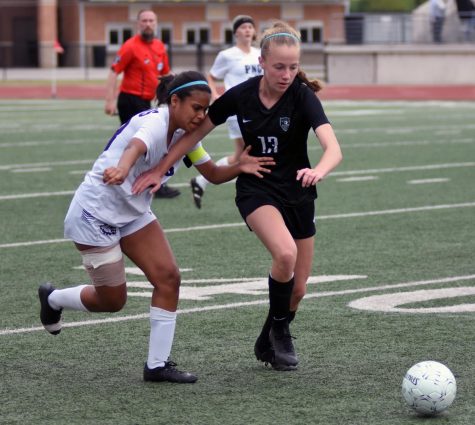
Kate Tiedtke runs to win a ball during the 2019 regional semifinal game against Port Neches-Groves during her freshman year.
Kate got home around 2 a.m. on Dec. 9. That same day she went through her regular school day, including soccer practice until 4 p.m. That’s when she noticed her heart was beating fast.
She wasn’t concerned. She was almost amused that it felt as though her heart were beating out of her chest. It became less of a novelty when it happened a few more times soon after.
Kate’s mom Laura Tiedtke called her pediatrician. Considering the circumstances – three soccer games, a plane flight and little sleep over the weekend – the doctor said Kate was probably just dehydrated. She suggested Gatorade and food.
After picking up Culver’s and some Gatorade, Kate mentioned how tired she was to her mom as she headed to her room to start homework.
Kate was still working on Algebra 2 when Laura went into her room and dropped off a pile of clothes. At that moment, Kate placed her homework down and then began to seize.
The 15-year-old was in cardiac arrest.
Kate’s body went stiff. Her skin turned gray. Her eyes were half closed. She wasn’t responding to her mom.
Laura yelled out to her husband, Darin Tiedtke. He saw Kate, and then he sprinted next door to get Katherine Brown, their neighbor of 21 years and retired nurse. As Brown and Laura lifted Kate off of her bed, Darin called 911.
Approximately five minutes later, Darin led firefighters from Houston Fire Station 101 to Kate’s bedroom, where the teenager lay on the floor as Brown administered CPR. They scooped Kate up and dragged her out of her bedroom to the hallway. There they cut off Kate’s gray Nike sweatshirt, put electrodes on her chest, and continued with CPR for another 22 minutes.
As Laura watched the paramedics trying to restart her daughter’s heart, she urged Kate to come back. “Come on, Kate; come on, Kate,” she thought, hoping her little girl would somehow sense her words. “You can do this, Kate; keep fighting, Kate.”
After 27 minutes of CPR, the firefighters and paramedics tried different methods to reestablish Kate’s heartbeat. Finally, magnesium sulfate worked.
Kate’s heart was beating once again.
A FAMILY IN CRISIS
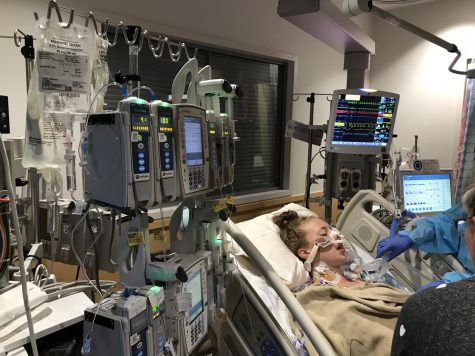
Kate Tiedtke remains hooked up to machines at Texas Children’s Hospital on Dec. 11. She went into cardiac arrest two days earlier.
Kate was lifted into an ambulance and rushed to Kingwood Medical Center, where she was stabilized. From there she was taken to Texas Children’s Hospital. Kate arrived downtown a little before midnight. Her older brothers Chase and Luke Tiedtke had already been there for more than half an hour.
Chase and Luke are both studying at the University of Texas at Austin. Luke was at an event with his girlfriend, and Chase was playing in an intramural basketball game when they received texts asking them to pray for their little sister.
“I couldn’t breathe,” Luke said. “I didn’t know what to do, what to say, what was going to happen because in that moment I had no idea what was going to happen to Kate. When you hear that someone’s heart isn’t beating you’re not really thinking the best, so I just was breathless.”
When Chase arrived home from his game he grabbed his keys and picked up Luke. Without music in the car or much conversation between them, they rushed back to Houston. They hadn’t packed any bags. They didn’t even worry about their upcoming finals.
When Kate arrived at Texas Children’s, the first thing the doctors told her parents was that her heart was not doing well. She already had a breathing tube. Texas Children’s doctors inserted a central line to inject medication directly into her jugular vein and a line in her leg where they could measure her blood pressure and pulse rate immediately. She was diagnosed with myocarditis, an inflammation of the heart muscle. That night the doctors worked to strengthen her heart.
“It was hard to watch,” Luke said. “Seeing your little sister with a tube down her throat sedated and incapable of speaking or pretty much doing anything is a difficult sight to see.”
LONG ROAD BACK
Kate doesn’t remember anything from Dec. 9 to Dec. 11. But it was a time her family will never forget. She used sign language to communicate what she needed. She signed “hot,” “cold” and “water” among other words that could help her get her point across.
“Once she started doing sign language we were like, ‘you know what, she’s going to be fine,’” Chase said. “If it happened to any of us she was the one that was going to be the one to survive it.”
Kate was in the hospital until Dec. 16. While she was adjusting to being back home, her classmates were taking their fall semester final exams. She didn’t take any finals or attend any classes the week of Dec. 16, but she did visit her soccer teammates one afternoon. She was greeted with big group hugs and questions about whether or not she’d be back on the field for the playoffs.
The answer was no. Kate wouldn’t be playing soccer anytime soon. The 2019 District 20-5A Newcomer of the Year would miss her sophomore season.
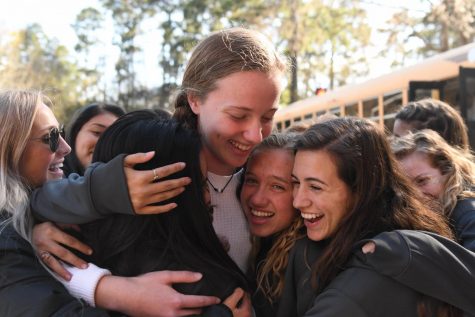
Soccer teammates join Kate Tiedtke in group hug on Feb. 21 at Fire Station 101 in Kingwood. The soccer team joined Tiedtke as she thanked the firefighters and medics who helped save her life.
The LifeVest she was given after she went into cardiac arrest keeps her from being able to do anything that could make her sweat, including simply being outside at temperatures above 85 degrees. It has three defibrillators on it and electrodes that are attached to her body. If she is to go into cardiac arrest again, it will automatically shock her heart in order to put it back into rhythm.
“If you look at Kate she looks perfectly fine and normal, and she goes about her day,” Laura said. “But the fact that she has to wear a LifeVest means that there has to be a significant reason for that, that she’s still not out of the woods.”
The vest must remain on for at least another three months. During a March 12 appointment, the doctors did an EKG and a stress test where Kate ran for the first time since before she went into cardiac arrest. Kate had hoped that those tests would grant her the ability to get rid of the LifeVest, but the time frame for how long the vest would be on was lengthened after the stress test showed some arrhythmia in the lower chambers of her heart.
Last year Kate had 15 assists and two goals. Now she gives out hugs and advice on the bench.
“I do enjoy watching soccer, so it’s not that bad,” Kate said. “I like talking to my friends on the bench so it’s fun and it helps me socialize more in soccer because otherwise I would be playing, which wouldn’t be the same. I’m already close with the girls that are playing because I played with them last year, so it allows me to interact with different people.”
Darin and Laura attend many of the games. Laura is still the team mom. She bakes cookies that the whole team eagerly anticipates.
Still, there is a void.
“I miss Kate being able to play soccer, to run around, to do the things she wants to do,” Darin said. “That’s tough. She’s fun to watch play soccer. She’s a smart player.”
Kate also had to pause her driving practice. She had her permit for about two months before she went into cardiac arrest. Now, she won’t be able to finish her Driver’s Ed course until she gets the LifeVest off. Her dad misses the half an hour that they would spend in the car where they were both fully focused on the road and each other.
“She’s pretty fun to ride with because you’re one-on-one,” Darin said. “She can’t be on her phone, she can’t be on electronics, so she drives for half an hour and she just talks.”
She can’t drive or play soccer. School has been the only place Kate has gone without her parents, other than the occasional bus rides home from soccer games. Even then, Laura’s car was always right behind the bus.
A NEW NORMAL
Laura, Darin and Kate all look at her situation differently. Laura watched it unfold from the moment Kate slumped over on her bed. Darin made the calls to 911 and their family, and Kate was the one in cardiac arrest.
“The whole thing is just crazy because I don’t remember anything, and every time I hear the story it’s just like storytime because it’s not like I was the one that was in the situation,” Kate said.
Laura and Darin remember it all.
“I don’t know that I have any sort of acute anxiety,” Darin said. “It just kind of looms over your head. It just is in the back of your mind all the time or a lot of the time; and if you ever stop and are quiet and think about it, it lives there.”
They’re ready for Kate to be able to do what she loves again. They want her to be able to play soccer, drive and hang out with friends without her parents so close all the time, but they don’t know when that will be.
“I don’t think things will ever be back to normal,” Darin said. “I think you get better every day, but you’re always wondering if it’s going to come back, right? I think that’s normal for anyone.”
While they can’t control how soon Kate is back to her usual routine, they’re focusing on being grateful for what they do have: Kate.
Laura often thinks about the “ifs.” If she hadn’t been in her room. If their next door neighbor nurse hadn’t been home. If her husband hadn’t been nearby. If the fire station was farther away.
If any of those things had not fallen into place, things might have turned out differently. The stars must have been in the right place that day, Laura believes. That’s why Kate is here today.



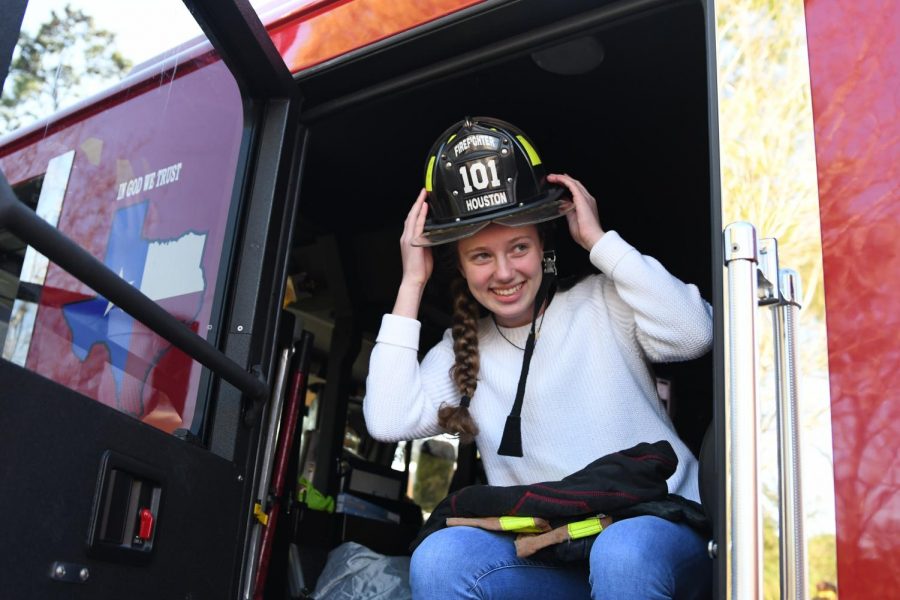
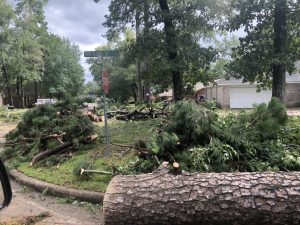





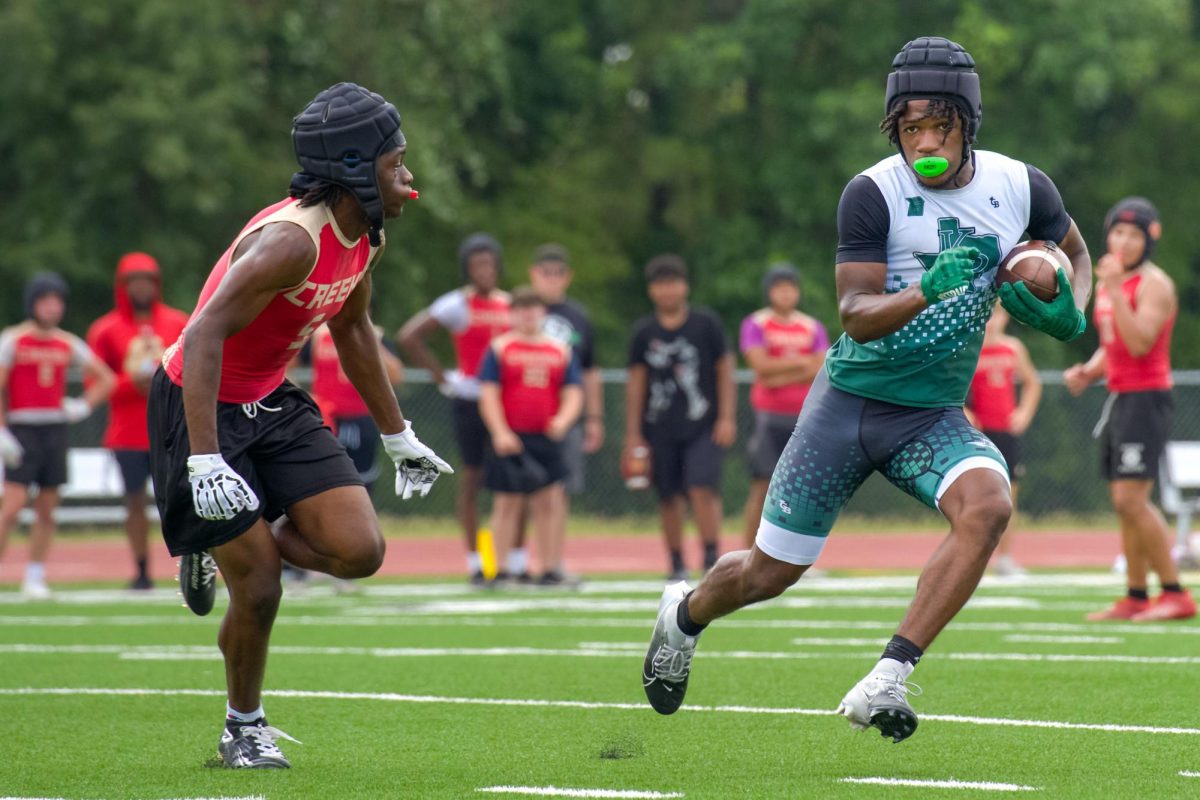

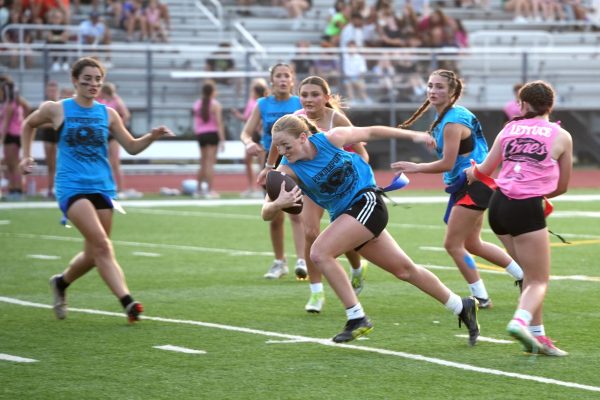
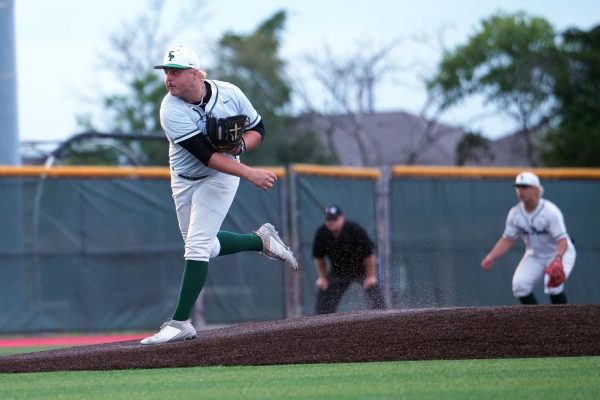

Kelly Tomasino • Dec 30, 2020 at 1:21 pm
Kate has always been one of a kind. She is amazing at everything she does. I am so grateful that God was watching over her and guiding the hands that made her survive that unimaginable day. Kate you were made for greatness, don’t ever forget.
Jayne Brandon • Dec 19, 2020 at 11:29 am
I had no idea!! I love Kate, and am so happy to read her amazing story of survival, and beating the odds!!
Mayce Bergman • Mar 24, 2020 at 10:02 am
I think the Good Lord was right there with you!! I can’t even imagine what you went through…it was hard enough just being a cousin in Nebraska!! I’m so so so thankful that Kate is Alive AND Well!! ?
Keith Jacobs • Mar 23, 2020 at 11:16 pm
As I know many others have said, The Good Lord was watching over Kate in a very special way. Aunt Gail and I send our love and will continue with our prayers. God has a place for you, stay well and happy it will all come together.
See you in Ponca in July
Keith & Gail Jacobs
Richard Smith • Mar 23, 2020 at 7:36 pm
What a beautiful and riveting portrayal of such a scary moment. Good job reporting and wonderful news about Kate.